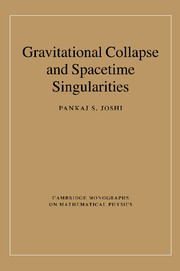3 - Spherical collapse
Published online by Cambridge University Press: 15 August 2009
Summary
A collapsing matter cloud, such as a massive star undergoing a continual gravitational collapse at the end of its life cycle, is modeled in general relativity as a dynamical spacetime geometry with a suitable energy–momentum tensor. The time evolution here is governed by the Einstein equations. The cloud has a boundary, with its interior collapsing continually as time evolves, and, at the boundary the interior spacetime is matched to a suitable exterior geometry so as to complete the full model of gravitational collapse. The physical situation considered here is that of the force of gravity being so overwhelming that no final, stable configuration, such as a neutron star or white dwarf, is possible as a collapse endstate, and a continual collapse inevitably proceeds. If the initial mass of the collapsing star is sufficiently high, then such a situation is realized.
In such a scenario, the classical theory leads the collapse to the formation of a spacetime singularity, as predicted by the singularity theorems of general relativity. The spacetime singularity is a region close to where the densities, spacetime curvatures, and all other physical quantities grow without bounds. At the singularity itself these are infinite, and hence, strictly speaking, the singularity is not part of the spacetime and is regarded as the boundary of the spacetime manifold. Eventually, as one moves closer to the singularity, the quantum gravity effects may dominate, which could resolve the classical singularity.
- Type
- Chapter
- Information
- Gravitational Collapse and Spacetime Singularities , pp. 60 - 134Publisher: Cambridge University PressPrint publication year: 2007

